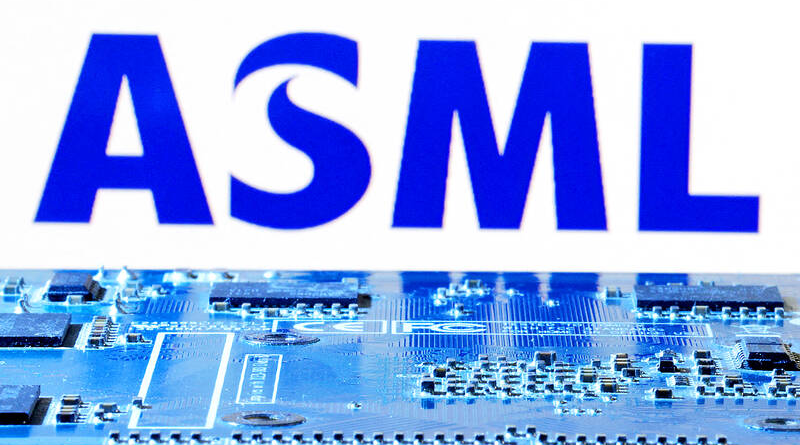ASML annual profits surge to US$8.5bn – 台北時報
Dutch tech giant ASML Holding NV, which supplies chipmaking machines to the semiconductor industry, yesterday reported a rise in annual net profit despite a high-tech trade spat between China and the West.
Net profits came in at 7.8 billion euros (US$8.5 billion) for last year, compared with 5.6 billion euros the previous year, the firm said.
“The semiconductor industry continues to work through the bottom of the cycle,” ASML Holding NV CEO Peter Wennink said in a statement.
Photo: Reuters
“Although our customers are still not certain about the shape of the semiconductor market recovery this year, there are some positive signs,” he added.
ASML is one of the world’s leading manufacturers of equipment to make state-of-the-art semiconductor chips, which power everything from mobile phones to cars.
However, the semiconductor industry has become a geopolitical battleground, as the West seeks to restrict China’s access over fears the chips could be used for advanced weaponry.
ASML earlier this month said that it had been blocked from exporting “a small number” of its advanced machines to China, amid reports of US pressure on Amsterdam.
At the time, Beijing lashed out at what it called “bullying behavior” by Washington, adding that it “seriously violates international trade rules.”
There are also concerns Beijing might introduce its own export controls on gallium and germanium — two rare earth metals critical for semiconductors.
ASML has shrugged off the financial impact of the geopolitical headwinds, with top officials saying the firm is well placed to weather the storm.
The company said it expects flat sales this year, which it has called a “transition year,” before registering “significant growth” next year.
Overall net sales last year came in at 27.6 billion euros, up from 21.1 billion euros in 2022.
The numbers for last quarter were also slightly better than the firm had expected, with profits of 2 billion euros on sales of 7.2 billion euros.
ASML said its pipeline was also robust, with net bookings nearly tripling to 9.2 billion euros in the fourth quarter compared with 2.6 billion euros in the previous quarter.
“Our strong order intake in the fourth quarter clearly supports future demand,” Wennink said.
However, net bookings were down for the year as a whole, at 20 billion euros compared with 30.6 billion euros in 2022.
The firm said sales in this quarter are expected to slow compared with the pace set in last quarter, with a forecast of 5 billion euros to 5.5 billion euros.
“In spite of the positive signs as described above, we maintain our conservative view for the total year and expect 2024 revenue to be similar to 2023,” Wennink said. “We also expect 2024 to be an important year to prepare for significant growth that we expect for 2025.”
ASML Holding NV and Taiwan Semiconductor Manufacturing Co (TSMC, 台積電) have ways to disable the world’s most sophisticated chipmaking machines in the event that China invades Taiwan, people familiar with the matter said. Officials from the US government have privately expressed concerns to both their Dutch and Taiwanese counterparts about what happens if Chinese aggression escalates into an attack on the nation responsible for producing the vast majority of the world’s advanced semiconductors, two of the people said, speaking on condition of anonymity. ASML reassured officials about its ability to remotely disable the machines when the Dutch government met with the company
United Microelectronics Corp (UMC, 聯電) yesterday held a ceremony to celebrate the arrival of the first equipment tools for phase 3 expansion at its Fab12i in Singapore. UMC, the second largest pure play wafer foundry operator in Taiwan, called the equipment move-in a new milestone for its production in Singapore with guests including representatives from Singapore’s Economic Development Board (EDB), Jurong Town Council (JTC), the Institute of Microelectronics (IME) as well as its construction partners, major equipment and material vendors. In February 2022, UMC announced plans to invest US$5 billion in the phase 3 expansion of its Fab12i, or Fab12i P3,
RETALIATION: Beijing is investigating Taiwan, the EU, the US and Japan for dumping, following probes of its market, as well as tariff hikes on its imports The Chinese Ministry of Commerce yesterday said it had launched a dumping investigation into imports of an important engineering chemical from Taiwan, the EU, the US and Japan. It would probe imports of polyoxymethylene copolymer, a thermoplastic used in many precision parts used in phones, auto parts and medical equipment, the Chinese commerce ministry said. The ministry is reviewing materials provided by six Chinese companies that applied for assistance on behalf of the industry on April 22, it said. The probe will target polyformaldehyde copolymer imported from suppliers in the EU, the US, Taiwan and Japan last year, and will assess any damage
RETALIATORY: The threat of levies comes as the EU is about to announce the results of its probe into China’s EV subsidies, which might result in it imposing its own tariffs China has signaled it is ready to unleash tariffs as high as 25 percent on imported vehicles with large engines, as trade tensions escalate with the US and EU. The China Chamber of Commerce to the EU said in a statement on X that it was informed about the potential move by “insiders.” The levies would affect European and US automakers and have a “significant” impact on relations with the EU, it said. Beijing is ramping up threats of retaliation as a deadline looms for the EU to announce the results of its probe into China’s electric vehicle (EV) subsidies. The bloc
